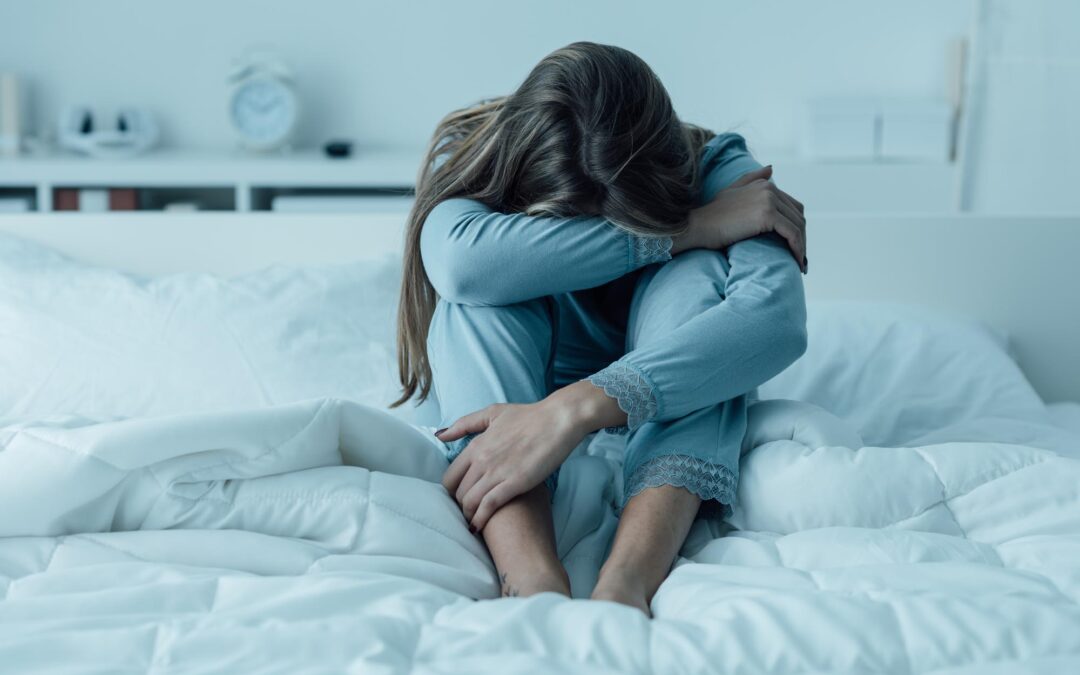Introduction
Sleep deprivation is a sneaky enemy, quietly damaging mental health. Not getting enough sleep affects your mood and makes anxiety and depression worse, which in turn affects your overall well-being. As you learn about how sleep deprivation affects mental health and ways to improve sleep quality, it’s important to understand why this matters.
In this article, you’ll find:
- A detailed look at sleep deprivation and its effects on the mind.
- Information on how untreated sleep disorders can impact mental health issues like PTSD, ADHD, and bipolar disorder.
- Practical tips for improving sleep quality to boost mental well-being.
- An examination of Cognitive Behavioral Therapy for Insomnia (CBT-I) as a possible treatment.
By making quality sleep a priority, you can greatly enhance your mental health and daily life.
Understanding Sleep Deprivation
Sleep deprivation, a condition characterized by insufficient sleep, can manifest in two primary forms: acute and chronic. Acute sleep deprivation occurs over a short period, such as one or two nights, whereas chronic sleep loss is persistent, often extending for weeks or months. Chronic sleep loss can severely impact mental health and daily functioning.
Statistics on Sleep Disorders:
- Insomnia, affecting about 30% of adults globally, is one of the most common sleep disorders.
- Narcolepsy, although rarer, affects approximately 1 in 2,000 individuals in the United States.
- The prevalence of other sleep disorders continues to rise as lifestyles become increasingly hectic and technology-dependent.
Recognizing the public health consequences of sleep loss is crucial. Insufficient sleep not only affects individual health but also has wider societal implications. It contributes to increased healthcare costs and diminished workplace productivity, posing a significant burden on economies worldwide. For instance, sleep and productivity for women is an area that highlights how lack of sleep can specifically affect female workforce participation and efficiency.
Public health authorities emphasize the importance of addressing chronic sleep loss as it intertwines with several physical and mental health challenges. By understanding the prevalence of sleep disorders and their impact on society, we can take proactive steps toward mitigating the adverse effects of sleep deprivation.
The Psychological Effects of Sleep Deprivation
Sleep deprivation significantly impacts mental health, often worsening anxiety and depression. When you don’t get enough sleep, your brain struggles to regulate mood, resulting in increased emotional distress. People who don’t sleep well often report feeling more irritable and stressed.
How Sleep Deprivation Affects Cognitive Functions
Cognitive functions also take a hit when you don’t sleep enough. Important tasks like paying attention, remembering things, and making decisions become harder. Think about trying to concentrate on something or make an important choice after a night of no sleep—it becomes much tougher. This drop in cognitive ability can affect how productive you are each day and lower your overall quality of life.
The Impact on Emotional Regulation and Relationships
When you’re sleep-deprived, controlling your emotions becomes another challenge. Lack of sleep makes it difficult for your brain to process feelings properly, which might cause you to overreact or misunderstand social signals. This can put a strain on relationships and make any existing mental health problems worse.
Understanding these psychological effects of sleep deprivation shows how crucial it is to prioritize good sleep for your well-being. The effects are not limited to mental health alone; they extend to physical health as well, leading to various health complications. Moreover, the relationship between sleep deprivation and its impact on emotional regulation further emphasizes the importance of maintaining a healthy sleep schedule.
How Sleep Disorders Affect Mental Health
Sleep disorders can take many forms, including restless legs syndrome and circadian rhythm disorders. Restless legs syndrome is when you feel an uncontrollable urge to move your legs, often with uncomfortable sensations. This condition can severely disrupt your sleep, leading to long-term sleep deprivation. Circadian rhythm disorders occur when your body’s internal clock is not aligned with the outside world, causing irregular sleep patterns.
The Link Between Sleep Disorders and Mental Health
If left untreated, sleep disorders can make mental health problems worse. Here are a few examples:
- PTSD (Post-Traumatic Stress Disorder): People with PTSD often have trouble sleeping, which makes their symptoms worse and slows down their recovery.
- ADHD (Attention Deficit Hyperactivity Disorder): Lack of sleep can intensify ADHD symptoms such as impulsiveness and difficulty focusing.
- Bipolar Disorder: Changes in sleep patterns can trigger mood swings, making it harder to manage bipolar disorder.
These connections show how important good sleep is for maintaining mental health. Treating sleep disorders is crucial for improving overall well-being and stopping the harmful effects of sleep deprivation on mental health. Understanding how lack of sleep affects mental health encourages people to find ways to improve both their physical and mental well-being.
Health Consequences Linked to Sleep Deprivation
Chronic sleep deprivation is a silent threat to physical health, contributing significantly to various severe conditions. Here are some of the major health issues associated with lack of sleep:
1. Cardiovascular Diseases
The link between inadequate sleep and cardiovascular diseases is particularly concerning. Persistent lack of rest can lead to elevated blood pressure, increasing the risk of hypertension. Over time, this strain on your heart can result in more serious complications like heart attacks or strokes.
2. Metabolic Health Issues
Another critical area impacted by sleep loss is metabolic health. Insufficient sleep disrupts insulin regulation, paving the way for diabetes. This disruption can make it challenging to maintain healthy blood sugar levels, thereby increasing diabetes risk.
3. Weight Management Difficulties
Sleep deprivation also plays a role in weight management difficulties. Hormonal imbalances caused by poor sleep can lead to cravings and overeating, contributing to obesity. This cycle becomes a self-perpetuating problem, as excess weight further disturbs sleep quality.
Addressing these issues requires prioritizing adequate rest, underscoring the importance of tackling sleep deprivation head-on for long-term health benefits.
Strategies for Improving Sleep Quality
Enhancing your sleep quality involves adopting practices that promote good sleep hygiene. Here are effective strategies to consider:
1. Establishing a Consistent Sleep Schedule
Align your body’s internal clock by going to bed and waking up at the same time every day, even on weekends. This regularity helps regulate your circadian rhythm and can significantly improve sleep quality.
2. Creating a Restful Sleeping Environment
Optimize your bedroom for sleep by ensuring it is dark, quiet, and cool. Consider using blackout curtains, earplugs, or a white noise machine if needed. Your mattress and pillows should be comfortable, supporting a restful slumber.
3. Stress Management Techniques
Incorporate activities that reduce stress before bedtime. Techniques such as deep breathing exercises, meditation, or yoga can help calm your mind. A relaxing bedtime routine signals to your body that it’s time to wind down.
Implementing these strategies can make a substantial difference in the quality of your sleep, setting a foundation for better mental health.
Cognitive Behavioral Therapy for Insomnia (CBT-I) as a Treatment Option
Cognitive Behavioral Therapy for Insomnia (CBT-I) stands out as an effective treatment for those grappling with insomnia and related sleep disorders. By focusing on altering the thoughts and behaviors that disrupt sleep, CBT-I offers a structured approach to improving sleep quality.
Components of CBT-I
- Sleep Restriction: Limits the time spent in bed to match actual sleeping time, gradually increasing it as sleep improves.
- Stimulus Control: Helps associate the bed with sleep rather than wakefulness or anxiety.
- Cognitive Therapy: Addresses negative beliefs and attitudes about sleep, promoting healthier thought patterns.
Individuals experiencing the effects of sleep deprivation on mental health can benefit significantly from this therapy. Not only does it improve sleep quality, but it also enhances overall mental well-being by addressing the root causes of insomnia. This non-pharmacological approach is recognized for its long-term efficacy, making it a preferred choice for many.
For those interested in exploring such therapy options further, this link provides valuable insights into various therapeutic approaches.
Taking Action for Better Mental Health Through Quality Sleep
Improving your well-being through quality sleep is not just important, but also a key part of maintaining good mental health. Making sleep a priority can help reduce the negative effects of not getting enough sleep, leading to better mood, thinking abilities, and emotional balance. The link between lack of sleep and mental health problems is clear, affecting everything from anxiety to decision-making skills. Understanding the importance of healthy sleep habits can change your mental state for the better.
How Sleep Affects Your Mental Health
Sleep deprivation can have a significant impact on various aspects of mental health, including:
- Anxiety: Lack of sleep can increase feelings of anxiety and worry, making it harder to relax and cope with stress.
- Depression: Sleep problems are often linked to depression. Getting enough quality sleep can help improve mood and reduce depressive symptoms.
- Cognitive Function: Sleep is crucial for cognitive processes such as memory, attention, and problem-solving. Insufficient sleep can impair these functions, affecting daily performance.
- Decision-Making: Sleep deprivation can lead to poor decision-making skills and increased impulsivity, which can have negative consequences in both personal and professional life.
The Importance of Good Sleep Hygiene
Good sleep hygiene refers to practices that promote consistent, uninterrupted sleep. By adopting these habits, you can create an environment conducive to restful sleep and improve your overall mental health:
- Establish a Sleep Schedule: Go to bed and wake up at the same time every day, even on weekends. This helps regulate your body’s internal clock.
- Create a Relaxing Bedtime Routine: Engage in calming activities before bed, such as reading or taking a warm bath, to signal your body that it’s time to wind down.
- Make Your Bedroom Sleep-Friendly: Keep your bedroom dark, quiet, and cool. Invest in comfortable bedding and consider using earplugs or eye masks if necessary.
- Limit Exposure to Screens: Avoid electronic devices (phones, computers, TVs) at least an hour before bedtime as the blue light emitted can disrupt your sleep-wake cycle.
- Be Mindful of Food and Drink: Avoid large meals, caffeine, and alcohol close to bedtime as they can interfere with your ability to fall asleep.
Seeking Professional Help
If you’re struggling with persistent sleep issues or experiencing significant mental health challenges, it’s essential to seek professional help. Consider reaching out to LightWork Therapy and Recovery for support.
Specialized Treatment for Women
LightWork Therapy and Recovery specializes in mental health treatment for women. Their team understands the unique struggles women face when it comes to managing both sleep problems and mental health conditions.
Whether you’re dealing with insomnia or other sleep disorders alongside anxiety or depression, their tailored approach can provide the guidance you need for recovery.
Taking Proactive Steps
Don’t wait for things to worsen before taking action. Prioritize quality sleep as part of your self-care routine and make it a non-negotiable aspect of your day.
Here are some practical steps you can take today:
- Set a consistent bedtime and wake-up time
- Create a relaxing pre-sleep ritual
- Optimize your bedroom environment for better sleep
- Limit stimulating activities close to bedtime
Remember that seeking expert help is always an option if self-management strategies aren’t yielding desired results.
Exploring LightWork Therapy’s Services
Curious about how LightWork Therapy can assist you on this journey? Visit our website to learn more about our services offered:
- Individual therapy sessions
- Group therapy programs
- Workshops focused on women’s mental health topics
These resources aim not only at addressing specific issues but also empowering women through education and community support.
Acknowledging Your Needs
It’s important to recognize when you need time off from work or daily responsibilities due to mental fatigue or burnout. Taking breaks is crucial for maintaining overall well-being.
If you’re unsure whether it’s necessary for you take a mental health day off work or not; here are some signs you need a mental health day that could guide you in making this decision.
By prioritizing quality sleep while simultaneously seeking professional support when needed; you’re taking significant steps towards improving both aspects – physical & psychological well-being!





